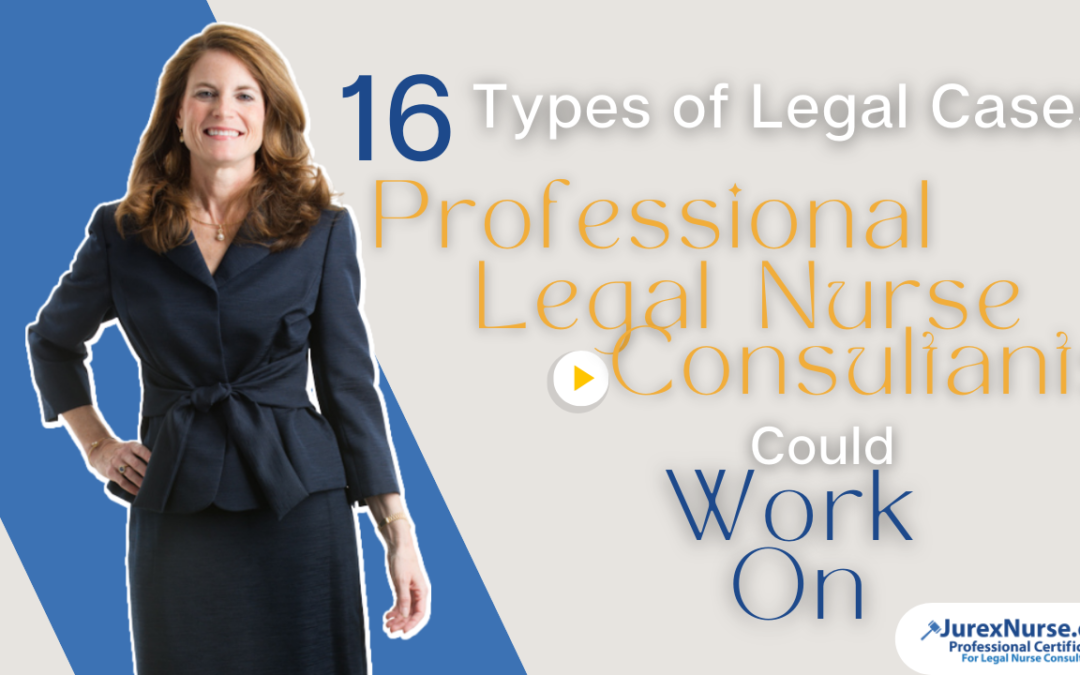Good news! Professional Legal Nurse Consultants (PLNC) handle all kinds of cases. There are approximatey 1.32 MILLION attorneys in the United States according to the American Bar Association. That’s a lot of lawyers who could use your skills. There are at least 16 different types of legal cases you could work on.
You’re a nurse. You’re qualified to be a Professional Legal Nurse Consultant. Let’s look at the legal nurse consultant benefits you’ll get when you use your nursing skills in legal cases. You get to be valued for your nursing and acquired legal knowledge and you earn money doing it.
- Let’s talk about the sixteen types of cases you’ll be able to work on as a PLNC
Medical Malpractice: By far, this is the most common type of case you’ll work on. You’d be surprised how often medical and nursing malpractice comes up in every day clinical practice. We’re talking “negligence”. When a professional nurse commits “negligence” it’s considered “medical malpractice” and, even more specifically, it’s called “nursing malpractice”. Who better than you to review the medical record when “nursing malpractice” is at issue? - Personal injury: You’ve heard the television commercials for car wrecks, slip and falls, liability at establishments. Inevitably, the individual will claim a personal injury. Often this is in addition to property damage. For example, in an automobile accident, the rear-ended driver could have both personal injury and property damage. You’d be reviewing the relevant medical records both past and present.
- Product liability: As nurses, you’ve administered medications and used durable medical equipment. Well, these products can potentially cause harm. In addition, your everyday consumer products also fall into this category.
- Toxic tort: Tort cases are basically negligence cases. Hazardous materials, lead poisoning, and radiation are examples of toxic materials that can be a part of a negligence case.
- Criminal defense: This is when someone is charged with a crime. Potential cases you might find yourself reviewing are driving under the influence (DUI), assault and/or battery, just name a couple. There are various stages of charging including arrest, arraignment, grand jury investigation, plea bargain and/or trial. Even appeal. Often times there are accompanying medical records that need reviewing.
- Elder Law: This area of the law has seen significant increases in recent years. Elder law includes anything from elder abuse and neglect to an estate contest, advanced directive, or even a conservatorship. Your job is to review the medical records and give your opinion.
- Workers’ Compensation: The goal of workers’ compensation laws is that of wage replacement and to provide medical benefits when an employee is injured during the job. There are specific workers’ compensation courts that handle these types of cases. You’re integrally involved as the medical benefit is central to the case.
- Social Security Disability: When an individual makes a claim for supplemental security income, the medical evidence is critical to their case. There could be medical records from multiple providers to be reviewed.
- Probate: Often contests on the decedent’s state of mind might be at issue in a last will and testament contest, a living will, or even a durable power of attorney for healthcare. The healthcare providers medical records will need to be carefully looked at in order to make this determination.
- Juvenile Justice: This area of the law revolves around children and adolescents. Not only could it involve crimes, but child welfare as well. The juvenile court system is usually separate from that of adults.
- Family Law: Domestic relationships can include issues including violence, custody, adoption, guardianship, surrogacy, and paternity to name a few. As a result, there are numerous medical records to review.
- Healthcare Law: The fun thing about this area of the law is that it largely centers around laws, regulations, and public policies. At issue could be access to health care, perhaps food or drug regulation, and other manner of medically-related issues.
- Pro Bono: “Pro bono public” translates into for the public good. This refers to legal services rendered to those unable to pay. As a PLNC, you may be able to assist an attorney in pro bono matters.
- Litigation: Litigation is broken down into two categories: civil and criminal. Lawsuits involve individuals and/or business entities. Litigation can go on for short or long periods of time. Often, the parties opt to settle the matter in order to resolve it.
- eDiscovery: With the advent of technology, finding out about each other’s cases has become much easier. “Discovering” the other side’s facts and theories is done through electronic requests. Plus, the medical record is usually provided in its digital format making it able to sent via email to you to review. As with any electronic data, there could be texts, emails, images, and metadata to review in addition to the electronic health record.
- Administrative Law: This refers to disciplinary action. For licensed healthcare providers, such as nurses, the Board of Nursing has the ability to proceed with disciplinary action against a nurse. Often the issue is related to nursing care.
There’re so many areas of practice where you can make a difference. Be open. And, you’ll broaden your skill-set.
P.S. Be sure you watch the Top Ten Services You’ll Get to Use as a Professional Legal Nurse Consultant.
P.P.S. COMMENT below about how excited you’ll be to help with 16 types of cases!

